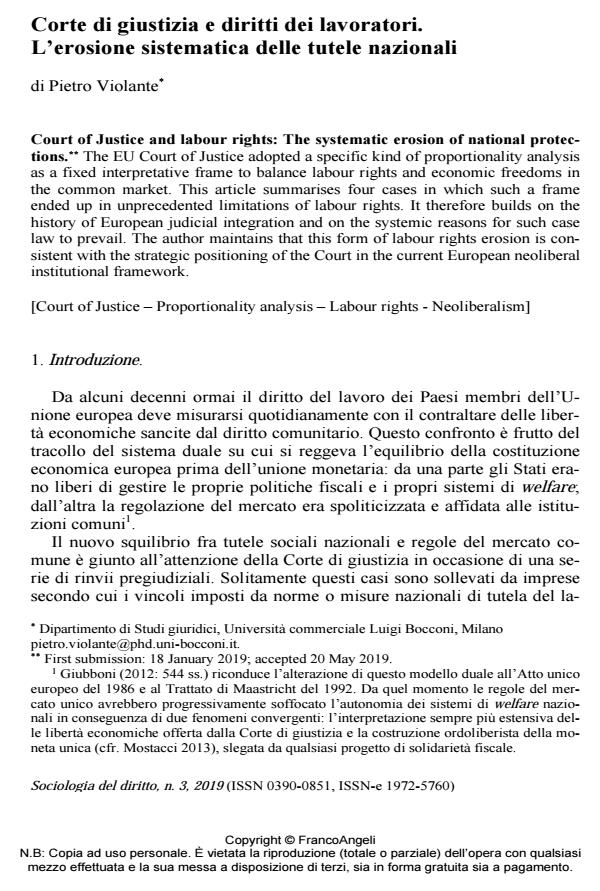Court of Justice and labour rights: The systematic erosion of national protec-tions.
Journal title SOCIOLOGIA DEL DIRITTO
Author/s Pietro Violante
Publishing Year 2020 Issue 2019/3
Language Italian Pages 18 P. 7-24 File size 191 KB
DOI 10.3280/SD2019-003001
DOI is like a bar code for intellectual property: to have more infomation
click here
Below, you can see the article first page
If you want to buy this article in PDF format, you can do it, following the instructions to buy download credits

FrancoAngeli is member of Publishers International Linking Association, Inc (PILA), a not-for-profit association which run the CrossRef service enabling links to and from online scholarly content.
The EU Court of Justice adopted a specific kind of proportionality analysis as a fixed interpretative frame to balance labour rights and economic freedoms in the common market. This article summarises four cases in which such a frame ended up in unprecedented limitations of labour rights. It therefore builds on the history of European judicial integration and on the systemic reasons for such case law to prevail. The author maintains that this form of labour rights erosion is consistent with the strategic positioning of the Court in the current European neoliberal insti-tutional framework.
Keywords: Court of Justice - Proportionality analysis - Labour rights - Neoliberalism
- Aleinikoff, T. Alexander, 1987. Constitutional Law in the Age of Balancing. Yale Law Journal, 96, 5: 943-1005. DOI: 10.2307/796529
- Antonaki, Ilektra, 2017. Collective Redundancies in Greece: AGET Iraklis. Common Market Law Review, 54, 5: 1513-1534.
- Ashiagbor, Diamond, 2009. Collective Labour Rights and the European Social Model. Law & Ethics of Human Rights, 3, 2: 221-266. DOI: 10.2202/1938-2545.1038
- —, 2013. Unravelling the Embedded Liberal Bargain: Labour and Social Welfare Law in the Context of EU Market Integration. European Law Journal, 19, 3: 303-324. DOI: 10.1111/EULJ.12025
- Campanella, Piera, 2017. Licenziamenti collettivi in Grecia al vaglio della Corte di giustizia: quale modello sociale europeo? Il lavoro nella giurisprudenza, 8-9: 784-801.
- Centamore, Giulio, 2017. Una certa idea di capitalismo. Autorizzazione preventiva al licenziamento collettivo e diritto dell’Unione Europea. Labor. Il lavoro nel diritto, 3: 299-313.
- Ciervo, Antonello, 2018. Le promesse di Prometeo: la crisi economica nello specchio del diritto. Alcune riflessioni a partire da un recente libro di Maria Rosaria Ferrarese. Sociologia del diritto, 1: 184-196. DOI: 10.3280/SD2018-001009
- De Witte, Floris, 2015. Justice in the EU. The Emergence of Transnational Solidarity. Oxford: Oxford University Press.
- Ferrarese, Maria Rosaria, 2017. Promesse mancate. Dove ci ha portato il capitalismo finanziario. Bologna: il Mulino.
- Gallino, Luciano, 2012. La lotta di classe dopo la lotta di classe. Roma-Bari: Laterza.
- Giubboni, Stefano, 2012. Solidarietà. Politica del diritto, 4: 525-553. DOI: 10.1437/73057
- –––, 2015. Lavoro e diritti in crisi: il caso italiano in prospettiva europea. Politica del diritto, 2: 257-270. DOI: 10.1437/81028
- –––, 2017. Ascesa e caduta del diritto del lavoro dell’Unione europea. Sociologia del diritto, 3: 7-28. DOI: 10.3280/SD2017-003001
- Harvey, David, [2005]2007. Breve storia del neoliberismo. Milano: Il Saggiatore.
- Koskenniemi, Martti, 2011. Law, Teleology and International Relations: An Essay in Counterdisciplinarity. International Relations, 26, 1: 3-34. DOI: 10.1177/0047117811433080
- Laagland, Femke, 2018. Member States’ Sovereignty in the Socio-Economic Field: Fact or Fiction. The Clash between the European Business Freedom and the National Level of Workers’ Protection. European Labour Law Journal, 9, 1: 50-72. DOI: 10.1177/2031952518758097
- Lindseth, Peter L., 2017. Viking’s ‘Semantic Gaps’: Law and the Political Economy of Convergence in the EU. In Fernanda Nicola & Bill Davies (a cura di), EU Law Stories. Contextual and Critical Histories of European Jurisprudence. Cambridge: Cambridge University Press.
- Mostacci, Edmondo, 2013. La sindrome di Francoforte: crisi del debito, costituzione finanziaria europea e torsioni del costituzionalismo democratico. Politica del diritto, 4: 481-558. DOI: 10.1437/76666
- Orlandini, Giovanni, 2017. Libertà di stabilimento versus diritto al lavoro: ancora un bilanciamento “sbilanciato” tra libertà economiche e diritti dei lavoratori. Giornale di diritto del lavoro e di relazioni industriali, 153, 1: 203-218. DOI: 10.3280/GDL2017-153013
- Piketty, Thomas, [2013]2014. Il capitale nel XXI secolo. Traduzione italiana. Milano: Bompiani.
- Pirker, Benedikt, 2013. Proportionality Analysis and Models of Judicial Review. Amsterdam: Europa Law Publishing.
- Polanyi, Karl, [1944]1974. La grande trasformazione. Le origini economiche e politiche della nostra epoca. Traduzione italiana. Torino: Einaudi.
- Pupolizio, Ivan, 2016. La sociologia del diritto nel XXI secolo. Sociologia del diritto, 3: 181-190. DOI: 10.3280/SD2016-003009
- Ruggie, John G., 1982. International Regimes, Transactions and Change: Embedded Liberalism in the Postwar Economic Order. International Organization, 36, 2: 379-415. DOI: 10.1017/S0020818300018993
- Scharpf, Fritz W., 2010. The Asymmetry of European Integration, or Why the EU Cannot Be a “Social Market Economy”. Socio-Economic Review, 8: 211-250. DOI: 10.1093/SER/MWP031
- Stone Sweet, Alec, & Jud Mathews, 2008. Proportionality Balancing and Global Constitutionalism. Columbia Journal of Transnational Law, 47: 72-164.
- Vauchez, Antoine, 2010. The Transnational Politics of Judicialization: Van Gend en Loos and the Making of EU Polity. European Law Journal, 16, 1: 1-28. DOI: 10.1111/J.1468-0386.2009.00494.X
- —, 2015. Brokering Europe. Euro-Lawyers and the Making of a Transnational Polity. Cambridge: Cambridge University Press.
- Wilkinson, Michael A., 2013. The Specter of Authoritarian Liberalism: Reflections on the Constitutional Crisis of the European Union. German Law Journal, 14, 5: 527-560. DOI: 10.1017/S2071832200001929
Pietro Violante, Corte di giustizia e diritti dei lavoratori. L’erosione sistematica delle tutele nazionali in "SOCIOLOGIA DEL DIRITTO " 3/2019, pp 7-24, DOI: 10.3280/SD2019-003001